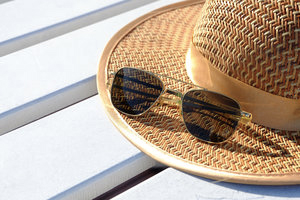Home » Blog » Will Sunglasses Protect You From Serious Eye Disease?
Will Sunglasses Protect You From Serious Eye Disease?
Posted by: Georgia Center for Sight

With summer in full swing, the days are longer, the sun hotter, and the threat from the sun’s damaging ultraviolet rays, greater. Georgia Center for Sightand the American Academy of Ophthalmology warns that excess sun exposure can put you at risk of serious short-term and long-term eye problems. This is true for young and old, year-round. Prevention is simple. Wear sunglasses that block ultraviolet radiation. But how do you know if your sunglasses are up to the task of protecting your family’s sight?
To bring attention to this important eye health matter, ophthalmologists — physicians who specialize in medical and surgical eye care — are sharing information on how to keep eyes safe from sun damage.
When shopping for sunglasses, look for a tag or label that says 100% protection against both UVA and UVB or 100% protection against UV 400. UV protection is the essential piece you need to look for in a pair of sunglasses. Darkness and color do not indicate the strength of UV protection, and neither does the price tag. Even the least expensive sunglasses can offer adequate protection.
If you doubt your sunglasses have the UV protection claimed by a retail tag, take them to an optical shop. Any shop that has a UV light meter can test your sunglasses. A UV light meter is a handy test for when you doubt your sunglasses have the UV protection claimed by a retail tag or if they are simply old and you want to make sure.
There is no doubt about the consequences of not protecting your eyes from the sun’s harmful rays. If eyes are exposed to strong sunlight for too long without proper protection, UV rays can burn the cornea and cause temporary blindness in a matter of hours.
Long-term sun exposure is linked to more serious eye disease, such as cataracts, eye cancer and growths on or near the eye. A lifetime of exposure also likely increases progression of age-related macular degeneration, a condition that can cause blindness.
In addition to shades, consider wearing a hat with broad brim. They have been shown to significantly cut exposure to harmful rays. Also, don’t forget the sunscreen!
Find more information on how to protect your eyes from the sun year-round at the Academy’s EyeSmart website.
